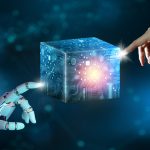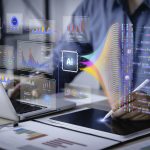Artificial Intelligence is speeding up logical and analytical tasks, shifting through datasets, identifying new patterns and helping to inform decision making. However, great business decisions are made with a significantly broader context than a single data point. Matt Jones, Lead Analytics Strategist at Tessella, explains in detail.
As organisations work within the confines of a human society, with human consumers and customers, these choices will need to take on board a human perspective. While AI can make predictions, it will never have a consciousness, be able to exhibit empathy, think laterally, or replace the human imagination ‘like-for-like’
AI’s qualities will see the technology implemented in almost all businesses, brought in to undergo high-speed data analysis in particular. As AI takes over simpler, repetitive data-centric tasks such as auditing or image-based diagnosis, the role of the human workforce will need to pivot to fulfil the tasks that AI simply cannot.
This level of proactive augmentation of business and workplace process in order to take full advantage of impactful, new technologies is not new. Consider the First Industrial Revolution, where much of the manual labour in fields and on factory floors were replaced with machines. The companies who adapted first fared the best.
The same evolution is happening in the Fourth Industrial Revolution and the age of advanced automation, intelligent machines and AI. To harness the developing cognitive capabilities of machines, business structures need to adapt to bring human employees into roles with complimentary and enabling skills. Companies will need employees with the expertise and sentience to effectively integrate an AI-led decision into the human sphere and hiring criteria will consequently need to change to prioritise these qualities.
‘Soft’ will be the new ‘smart’
Machine learning will beat humans when it comes to clearly-defined logical tasks with data at the core, in both speed and accuracy, and in many instances already has. A computer though, however much processing power it has, will never be able to empathise, think laterally and engage with a decision like a human can.
We have seen the danger of getting the AI/human balance wrong – just look at Microsoft’s Tay bot, which created Tweets based on existing conversations on Twitter. With no understanding of context, the bot emulated the sentiment of other users tweets and subsequently learned from these to produce its own racist ones. If not managed, AI’s inability to understand the ‘human’ context could ruin businesses; leading to misunderstandings, bad products and unhappy customers.
Organisations should no longer seek out new hires based solely upon knowledge and technical ability but must instead focus on candidates that can offer the softer-skills and ‘emotional IQ’, necessary to bridge the gap between AI and other human beings[1]. The role of a doctor will evolve to handle the emotional aspects of a medical diagnosis. Machine learning and AI will sort the fact-finding; analysing patterns in symptoms, interpreting medical imaging scans or searching for relevant treatments. Doctors will work to give the ‘personal touch’, the bedside manner when explaining a diagnosis, or treatment plan to patients.
That’s not to say that we won’t have to understand how to effectively interact with an AI at all. The AI will complete the analysis and present the options, but we will still need to know how to give the technology context to make sure the options and results presented are relevant and appropriate. AI will help auditors for instance by sifting through datasets of financial records but will need help to identify evolving types of fraud. Employees will help their AI assistants define these contexts by identifying relevant datasets, such as examples of inflated expenses claims, to help an algorithm learn to identify these cases in the future.
Preparing for the future
Emotions may not be the only human characteristic in high-demand. As businesses move to harness AI they will begin to value creativity and imagination more. The analytical and predictive power of AI will be used to test and augment new ideas and has the potential to dramatically reduce the cost and risk of bringing new products and services to the marketplace by making better-informed predictions on customer need and market performances. However, businesses will still need to draw on creativity and the human imagination to build a realistic picture of the future from this analysis. To appropriately predict and plan for the unexpected events, things that haven’t happened before, including tricky moral issues or nuanced diagnoses. For these, they need humans on hand to help.
In the pursuit of an emotive and creative workforce, businesses will need to think carefully about their workplace culture. Just like company cultures have changed now we have the devices and connections to work remotely, with more employees working from their own homes and remote offices, we’ll begin to see businesses redesigning their working environment to bring together the skills to make AI most effective. This will include breaking down information silos so data transfers between departments, whether marketing or legal, remain completely transparent – so no opportunities to harness this information are missed.
[1] https://hbr.org/2017/06/in-the-ai-age-being-smart-will-mean-something-completely-different










